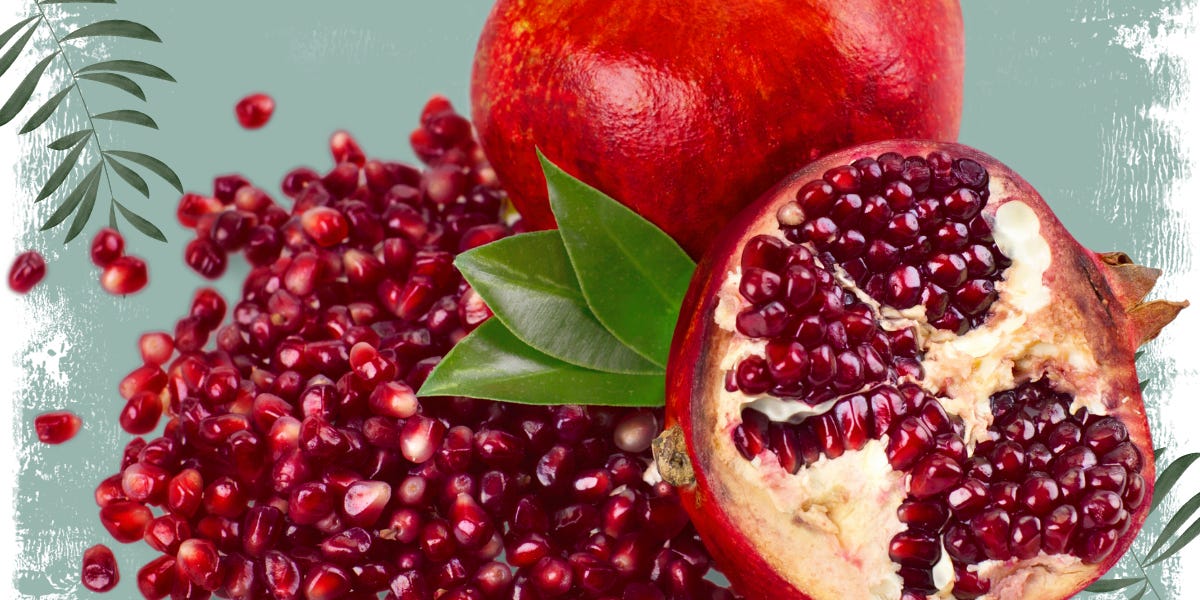The 'Incomplete Protein' Myth
Carnivores beware. Contrary to popular belief, it seems ALL plants have All the essential amino acids, making them ALL complete proteins. Say what?!
Image: Pomegranate image by author in Canva Pro
It was Dr Neal Barnard who posted the new (2016) research on Instagram. But in fact, further checking revealed that this had been known for some time.
In fact, for 72 years.
Contrary to popular belief, it seems ALL plants have All the essential amino acids, making them all a complete protein.
Let me repeat that with gravel in my voice.
ALL PLANTS ARE COMPLETE PROTEINS.
What are essential amino acids?
There are 20 amino acids, which are the building blocks for protein.
Nine of them are ‘essential.’ They are called ‘essential’ because it’s ‘essential that we eat them’. We can’t make them without food sources.
The myth is that many plant-based foods have only 8 of the 9 essential amino acids. The thinking was that you can get all nine if you eat a variety of plant foods eg rice and beans. You don’t need all 9 in one meal, just over about 24 hours.
The big game-changing study was conducted by Harvard and involved 131,342 people for up to 32 years. That’s a lot of people and a long time!
The findings were that Eating more plant protein is associated with lower risk of death. That’s a corollary benefit. The shock was that it flies in the face of decades of continual propaganda pushing meat for ‘complete protein’.
Turns out there’s no such thing as a complete protein. Or there is, but plants have them too. Not only do ALL plants have complete proteins, but you’re less likely to die if you eat plenty of them.
Resistance to vegetarian diets
You may have heard ‘Yeah I’d like to be vegetarian, but where do you get your protein?”
All protein is from PLANTS. The humble potato is about 3 percent protein.
Proteins are made from amino acids. When they are digested, they are broken down into the amino acids.
Some are reformulated to make new proteins for cell growth, cell repair, neurotransmitters, and so on.
If you eat too many, they are stored as fat or carbs. You can’t store protein in your body.
Protein is everywhere. Even animal protein is mostly the plants they consume. The amino acids in their flesh are from oats, grasses, barley, cattle feed.
So, you can take out the middle-man. Or should I say, the middle-cow.
The research was published in JAMA Internal Medicine in August 2016.
Surprisingly, as I combed through articles looking for this I found another one with the same findings. It was from 1952.
In 2002, it was drawn to the attention of the American Heart Association by Dr John McDougall.
He is the founder of the McDougall Program. You know it?
In his statement to the AHA, titled Plant Foods Have a Complete Amino Acid Composition (link) McDougall writes:
The American Heart Association (AHA) Science Advisory… contains often quoted, but incorrect, information about the adequacy of amino acids found in plant foods…
:any single one or combination of these plant foods provides amino acid intakes in excess of the recommended requirement…
Dr McDougall later says, ‘The reason it is important to correct this misinformation is that many people are afraid to follow a healthful, pure vegetarian diet–they worry about “incomplete proteins” from plant sources.”
So kudos to Dr John McDougall for setting the record straight way back then and Dr Neal Barnard for fixing it back in the social media agenda.
My mistake
That means one thing. I have unwittingly repeated the ‘incomplete protein’ myth in Rule 2 of the Food Medicine Diet for MS.
In rule 2, you can choose whether to go fully plant-based or continue eating some animal products of high quality.
My recommendation is to go plant-based, but you don’t have to. It’s always your choice.
I will remake that section.
Now, it’ll be even clearer and simpler than ever.
Appreciation to William Rose and colleagues. The amino acid requirement of adult man. Nutr Abst Rev. 1957;27:631–647 as well as Drs Barnard and McDougall.
Check out the links for the research.
If you don’t want to do the research, I’ve done it for you. Check out the Food Medicine Diet for MS
Or you can simply subscribe to the newsletter for free.
.






